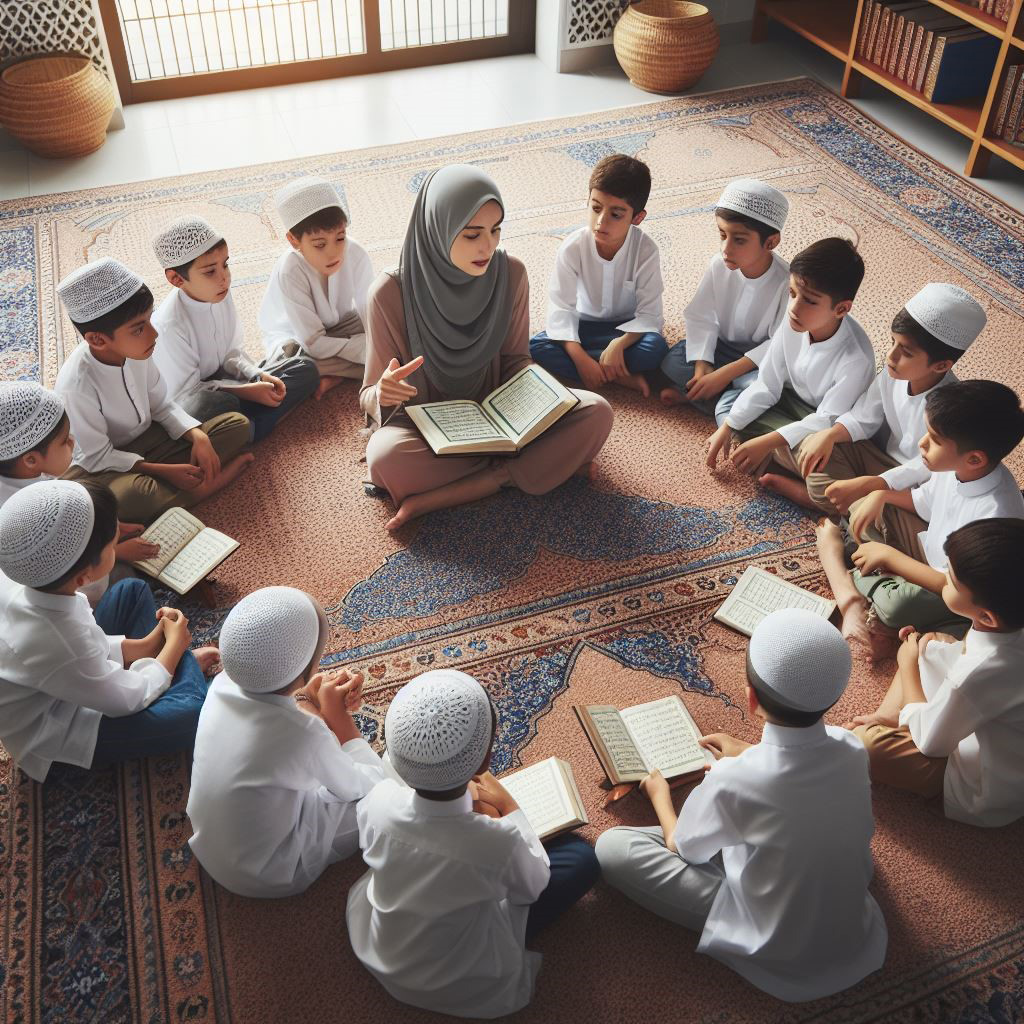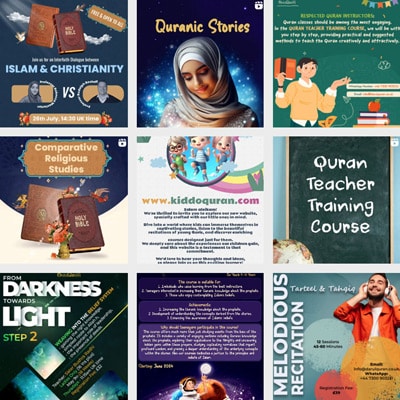Importance of Quranic Education During Childhood
Childhood is a critical period in a person’s development, as it is during this time that core values and beliefs are formed. Quranic education plays a crucial role in shaping a child’s moral compass, instilling in them a sense of righteousness, compassion, and humility.
Table of Contents
ToggleThe teachings of Quran promote virtues such as honesty, kindness, and respect for others, which are essential qualities for a well-rounded individual. By introducing children to Quran at a young age, we are laying the foundation for a strong moral character that will guide them throughout their lives.
Furthermore, Quranic education provides children with a deep understanding of their faith and strengthens their connection with Allah. It allows them to develop a sense of spirituality and fosters a love for Quran and its teachings.
This connection with their faith can serve as a source of solace and guidance during challenging times, helping children develop resilience and inner strength.
Benefits of Quranic Education for Children
Quranic education offers a multitude of benefits for children, both academically and personally. From an academic perspective, the study of Quran enhances critical thinking skills, linguistic abilities, and memory retention.
Children who engage in Quranic education often exhibit improved reading comprehension and linguistic proficiency, as they learn to decipher and understand the Arabic script. Moreover, the memorisation of Quranic verses stimulates memory recall and strengthens cognitive abilities.
On a personal level, Quranic education fosters a sense of discipline and self-control.
The commitment required to memorise and recite Quran teaches children the value of perseverance and hard work. It also encourages self-reflection and introspection, as children engage with the profound messages contained within the verses.
By internalizing the teachings of Quran, children develop a strong moral compass and a heightened sense of personal responsibility.
Quranic Education Statistics
The importance and popularity of Quranic education can be observed through various statistics. According to a study conducted by Pew Research Center, approximately 1.8 billion Muslims worldwide consider Quran to be the literal word of God. This signifies the immense influence Quran holds within the Muslim community and highlights the widespread belief in the significance of Quranic education.
Within the realm of formal education, Islamic schools and institutions have been steadily growing. In the United Kingdom alone, there are over 150 Islamic schools that provide Quranic education alongside mainstream curriculum subjects.
This demonstrates the commitment of Muslim parents to ensure their children receive a holistic education that encompasses both religious and secular knowledge.
Quranic Education Methods and Curriculum
Quranic education can be imparted through various methods, depending on the child’s age, abilities, and learning style. Traditional methods involve recitation and memorization, where children learn to recite the noble Quran in its original Arabic language.
This method focuses on perfecting the pronunciation and melody of the verses, ensuring an accurate and beautiful recitation.
However, modern approaches to Quranic education also incorporate interactive and engaging methods.
Technology has played a significant role in this regard, with the development of mobile applications and online platforms that provide children with interactive Quranic lessons.
These resources often include games, quizzes, and animated videos to make the learning process more enjoyable for children.
In terms of curriculum, Quranic education typically covers the memorisation and recitation of the sacred Quran, as well as its interpretation and understanding. Children are exposed to the stories and teachings of the prophets, learning valuable life lessons and moral principles.
Additionally, Islamic studies are often included, which delve into the broader aspects of Islam, such as the pillars of faith, the life of Prophet Muhammad (S), and the history of Islam.

Incorporating Quranic education at home
While formal Quranic education is essential, parents also play a vital role in nurturing their child’s Quranic education at home. Creating a conducive environment for Quranic learning can be achieved through various means. First and foremost, parents should set an example by engaging in their own Quranic studies and demonstrating a love for the noble Quran.
This will inspire children and encourage them to develop a similar passion for their faith.
Reading and reciting the Holy Quran together as a family can be a bonding experience and provide opportunities for discussion and reflection.
Parents can also explore additional resources such as storybooks and audio recordings that simplify Quranic concepts and make them more accessible to young learners.
Furthermore, incorporating Quranic values into daily life, such as acts of kindness and generosity, helps children understand the practical application of Quran’s teachings.
Choosing the Right Quranic Education Program or School
When selecting a Quranic education program or school for your child, it is crucial to consider several factors.
Firstly, evaluate the curriculum to ensure it aligns with your educational goals and values. Look for programs that provide a balanced approach, combining both Quranic studies and secular subjects. Additionally, consider the teaching methods employed, as interactive and engaging lessons tend to be more effective in capturing a child’s interest.
Furthermore, assess the qualifications and experience of the instructors.
Qualified and knowledgeable teachers can make a significant difference in a child’s Quranic education journey.
Research the reputation and track record of the institution to ensure a high standard of education.
It may also be beneficial to seek recommendations from other parents or visit the institution personally to get a better understanding of the learning environment.

Resources for Quranic Education
In today’s digital age, there is a wealth of resources available to support Quranic education.
Mobile applications and online platforms provide interactive lessons, Quranic recitation, and translations in multiple languages. These resources often include features such as word-by-word pronunciation and explanations, making it easier for children to grasp the meaning and context of the verses.
Additionally, there are numerous books, workbooks, and flashcards specifically designed for Quranic education.
These resources cater to different age groups and learning levels, providing a comprehensive learning experience. Parents can also access audio recordings of renowned Quranic reciters, allowing children to listen and learn from the experts.
Challenges and Solutions in Quranic Education
Despite the numerous benefits of Quranic education, there are challenges that need to be addressed.
One common challenge is the language barrier, as the sacred Quran is primarily written in Arabic.
This can pose difficulties for non-Arabic speaking children and parents.
However, there are resources available that provide translations and explanations in various languages, making the noble Quran more accessible to a wider audience.

Another challenge is the lack of qualified teachers and institutions in some regions.
To overcome this, online platforms and distance learning programs can be utilized, connecting students with qualified instructors regardless of geographical constraints. It is also essential to invest in training and development programs for teachers to enhance their skills and knowledge in Quranic education.
In conclusion, Quranic education is of paramount importance during childhood as it lays the foundation for a child’s moral and spiritual development.
The teachings of the Holy Quran instill essential values, promote critical thinking, and enhance linguistic abilities. Quranic education not only provides children with a strong connection to their faith but also equips them with the necessary tools to navigate life’s challenges.
By incorporating Quranic education at home and selecting the right Quranic education program or school, parents can ensure their children receive a comprehensive and well-rounded education.
The availability of resources and technological advancements have made Quranic education more accessible than ever before. Despite the challenges that may arise, the lifelong impact of Quranic education makes it a worthwhile investment in a child’s future.
Call to Action
To provide your child with a strong foundation and a well-rounded education, consider incorporating Quranic education into their learning journey.
Explore the resources available, both online and offline, and choose a Quranic education program or school that aligns with your values.
Nurture your child’s love for Quran and its teachings, and witness the lifelong impact it can have on their character and values.
Start building strong foundations today with DarulQuran Academy!

















